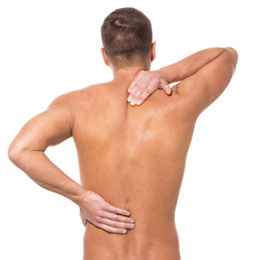If you are experiencing pain in the left side of your back, and if the pain sharpens when deep breath is taken, then this Buzzle article is for you. It describes common possible causes of left back pain when breathing, and things you can do to lower the pain.

People of all ages have to face the problem of bone or muscle pain, at some point in their lives. Back pain is one of the most common types of pain. The back is relatively more susceptible to an injury, because it's responsible for bending, twisting, lifting, balancing, supporting, etc. In most cases, simple home remedies help relieve back pain. However, severe back pain, or pain accompanied by chest pain, shortness of breath, and profuse sweating, needs prompt medical attention. A heart attack, an injury, or a disorder that involves dysfunction of an internal organ can lead to such pain.
Common Causes of Left Back Pain
There are two main types of pains in the back. The first is due to aching bones, and the second is due to aching muscles.
➺ The pain in the spine or the back bone may be due to some hectic activity. Heavy lifting or exercising too hard can lead to muscle strain or spine injury.
➺ A pulled muscle during exercise can be the cause of the pain. If you have the upper/lower left back pain when breathing, it's most probably due to a muscle spasm or a pulled muscle. Continuous strain on the muscles can lead to stressed tendons.
➺ The lower/upper left back pain when breathing can be experienced if a muscle is injured. Movement of the hand or body may lead to severe pain in that particular area. Breathing will also trigger a pain in that area, as breathing involves movement of the rib cage, chest, and back. A blow at the diaphragm or a pulled diaphragm muscle can be a cause of sharp pain in back when inhaling.
➺ Repetitive movements (for example, bending when gardening), or an incorrect posture can lead to back pain. Those who have to sit in a particular position for a long period of time, or have to ride a motorcycle or a bicycle over a long distance, usually complain about back bone pain. Sitting in a wrong posture for hours results in back pain. Sometimes, standing or sleeping in the wrong posture strains the muscles.
➺ Some problems related to the spinal cord, such as slipped disc (a disc bulges or ruptures, it may even exert pressure on the sciatic nerve), spinal arthritis, spondylitis, spinal stenosis, etc., can lead to pain in back when inhaling.
➺ Another very common cause of back trouble is nerve shingles. Kidney infection or kidney stones, pancreatitis, inflammation of the gallbladder, etc., can also lead to back pain that is sharpened when breathing.
➺ Obesity and sedentary lifestyle can also lead to back pain when breathing.
➺ Apart from these, lower/upper left back pain may also be caused due to psychosomatic disorders like tension myositis syndrome (TMS). Along with the pain, the person may experience stiffness, weakness, tingling sensation, or numbness in the back.
➺ Back pain when breathing can also be an indicator of cardiovascular diseases or severe pulmonary conditions. Usually, such pain isn't isolated to the back alone, it is accompanied by severe chest pain. Coronary artery disease, certain types of cancers, dissection of the aorta, heart attack, pneumonia, asthma, etc., can lead to back pain and shortness of breath.
Back pain can only be cured by giving it some rest. You can also treat it by applying an ice pack or even heat. But getting enough rest is very important. Stretching exercises, yoga, physical therapy, warm bath, massage, prescribed medication, etc., can help improve the flexibility of muscles. You may have to undergo certain tests to determine the exact cause of back pain when breathing. Prompt diagnosis and treatment can help prevent worsening of the condition.
Disclaimer: The information provided in this article is solely for educating the reader. It is not intended to be a substitute for the advice of a medical expert.


 People of all ages have to face the problem of bone or muscle pain, at some point in their lives. Back pain is one of the most common types of pain. The back is relatively more susceptible to an injury, because it's responsible for bending, twisting, lifting, balancing, supporting, etc. In most cases, simple home remedies help relieve back pain. However, severe back pain, or pain accompanied by chest pain, shortness of breath, and profuse sweating, needs prompt medical attention. A heart attack, an injury, or a disorder that involves dysfunction of an internal organ can lead to such pain.
People of all ages have to face the problem of bone or muscle pain, at some point in their lives. Back pain is one of the most common types of pain. The back is relatively more susceptible to an injury, because it's responsible for bending, twisting, lifting, balancing, supporting, etc. In most cases, simple home remedies help relieve back pain. However, severe back pain, or pain accompanied by chest pain, shortness of breath, and profuse sweating, needs prompt medical attention. A heart attack, an injury, or a disorder that involves dysfunction of an internal organ can lead to such pain.